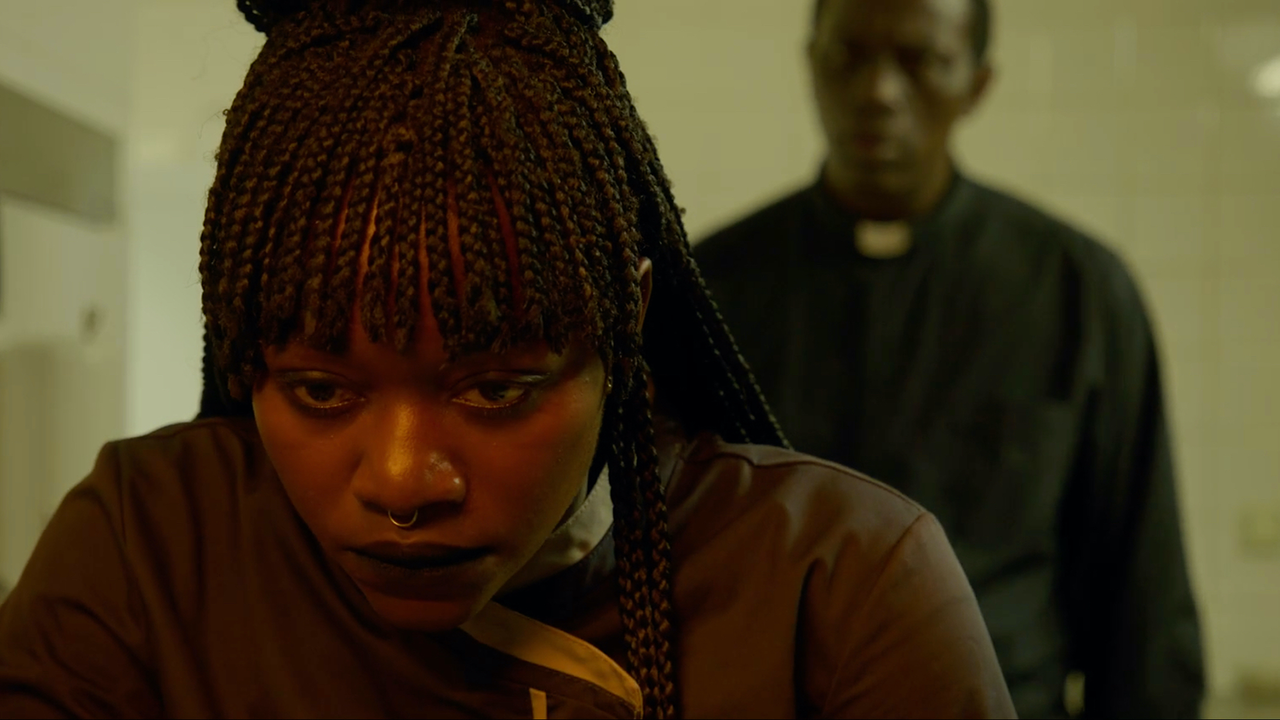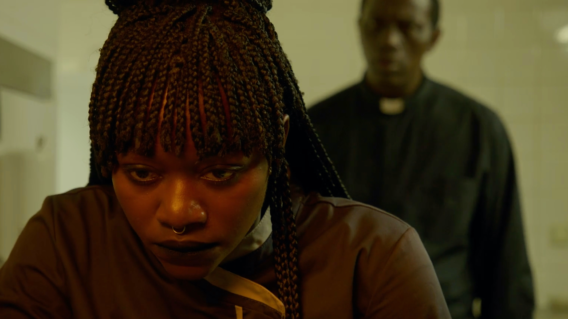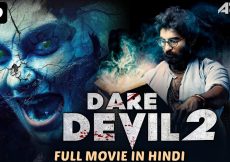

The landscape of the rape-revenge film is changing, with the once exploitative subgenre now being reclaimed by female directors as a cathartic way to explore trauma. Such is the case for Ellie Foumbi’s feature film debut Our Father, The Devil, an incredible entry into the contemporary rape-revenge canon.
Read the film’s full synopsis:
Marie is the head chef at a retirement home in small-town France. Her day-to-day life is spent caring for residents, hanging out with her co-worker and best friend Nadia, and teasing a potential new romance. But, this is all disrupted by the arrival of Father Patrick, an African priest whom she recognizes from a terrifying episode in her homeland. As he further endears himself to the residents and staff, Marie is forced to decide how best to deal with this reminder of her troubled past.
Dread Central spoke with Foumbi about her love of the horror genre, crafting her version of the rape-revenge story, choreographing intimate moments, and more.
Dread Central: Why this for your first feature? Where was the beginning of Our Father, The Devil for you?
Ellie Foumbi: Curiously, this was not what I thought I would make for my first film. I was trying to make a very different movie, but I grew up watching a ton of horror. I love thrillers. My heart lives in between those two genres. And this one had been living with me for a while and it was very unexpected. My dad worked for the UN and he was working in Rwanda after the genocide, probably a decade after the genocide. And because of his work there, I had access to a woman who was running an NGO, who was a good friend of his.
I was really curious about what he was doing, and it was this whole thing about reconciliation and forgiveness. The country instituted a national forgiveness program, which I thought was absolute insanity. I was like, “There’s no way you’re going to get one-half of the country to forgive another. People were murdered, maimed, parents were killed, people were orphaned,” and [my dad] was like, “Go talk to this woman, see what she’s doing.”
My dad and I have always had a very open dialogue about his work and even some of these difficult topics from the time I was very young. So I got access to survivors of the genocide, talking to them, and hearing the most horrific stories that to this day I cannot unhear. I still wake up with nightmares in the middle of the night thinking I can’t believe this happened to somebody.
There was one kid who described his parents’ murder. I didn’t even ask him, but he started talking about it, and then I felt like I couldn’t stop him. So I heard it, and then he said he thought of nothing but killing those people for 12 years. That was the thought. He woke up with the thought, he went to sleep with it, and then he realized he wasn’t able to have any kind of relationship. He wasn’t able to be intimate with women. And then that’s when he sought therapy.
After that, I just couldn’t stop thinking about what if this were me. The whole thing was so horrific. And then I started looking at child soldiers and this idea of responsibility and who is at fault and how the victim becomes a perpetrator. One of the things [the boy] said to me was that there were a lot of kids who were murdering people at that time. So that’s sort of how I became low-key obsessed with this idea of revenge and looking at the aftermath of war and whether is it possible to heal. What does healing look like?
I talked to these kids who were now on the other side of it, I then was much more interested in the aftermath than wanting to look at the life of a child soldier 20 years after the event. Because this is not my personal story, I had a really hard time when I initially started writing it. So I put it down for a couple of years. When I couldn’t get another thing made, this just came roaring back.
DC: I was so curious about how you got connected to the child soldier angle because we don’t see a lot of those narratives in cinema at all. And especially as someone who loves rape revenge, these films are often very white. They’re often focused on white women’s experiences and in a very particular context. Seeing a rape-revenge movie that is so outside of the usual context is so important.
EF: Totally. And I will say this, I mostly spoke to men, so I made the decision to tell Our Father, The Devil from a woman’s perspective. And what you’re saying is so, so true. I think of films like I Spit On Your Grave, and I was like, “I haven’t seen this.” Because what is really at the crux of Our Father, The Devil, it was this rape that really stayed with her. The rape was something that she carried in her body, that really got in the way of her having intimate, and of really being able to move forward in her life.
That for me was so at the crux of what was burdening this woman. One thing I’m really proud of is that you don’t know that off the bat, but it’s something that you slowly uncover. I wanted to build this film kind of like an onion, where you finally get to that core and you’re like, “Oh my God, this is what it is. This is really why she can’t let this go.”
DC: There’s a moment of intimacy that I would love to hear more about how you directed it. I won’t go into too many spoilers, but to be really candid as a survivor of sexual assault, and I know it’s a very different context, seeing this desire to get back into intimacy and the way you focus on Babetida [Sadjo], who plays Marie just made me cry. You don’t often see how hard it is to embrace that intimacy after assault.
I wanted to hear more about choreographing and what it was like to be in that room filming that moment.
EF: There was so much unknown. I think it was the scene I was the most nervous about. First of all, there was a lot of trust built. I mean, everything was choreographed by Babetida who took ownership of that. She said to me, “I really want to be at the head of choreographing this.” And I said of course. Franck Saurel, who plays Arnaud, he was the right actor because first of all, he just oozes a certain vulnerability himself. So we really crafted it with what she was comfortable with. But then even with all that, and they had a great connection, chemistry from the beginning, which helped, but it was a closed set.
I remember when we were shooting it, no one knew what was going to happen. It’s such a vulnerable thing. And Babetida has her own history. I will let her talk about it when she’s ready, but she has her own history with this. So it was like she just came to life in a way that moment. I don’t know how it was scripted, I can’t even remember. But I just remember watching the screen and I was crying when I was watching her perform. I was realizing, “Oh, this is the moment that she gets to reclaim that part of herself, even if it’s just for a second.”
This is her moment to reclaim what was stolen from her, all the years that she lost, not just being able to have this simple pleasure. Kudos to my DP, the way that he covered that and the way the camera comes around and you see how scared she is to let go, but then she feels reassured that she’s okay.
DC: This movie so deeply understands what a lot of movies don’t about putting these kinds of traumas on screen. This isn’t about spectacle. And I’m crying, but it really is just so important to see those kinds of scenes and understand that such an important part of that healing process is just being comfortable in your own body. And I just love that about Our Father, The Devil.
EF: Thank you for saying that. I made this film for you and for all the victims. It’s the truth, and I put a lot of care into building this character and did so much research. I always wanted it to feel authentic. And so it makes me so proud. It really touches me that you kind of validate that. So thank you for sharing that.
DC: Absolutely. There’s so much depth to Marie’s character. I would love to hear both how you set out with writing her, and then how working with Babetida also shaped Marie.
EF: We really complimented each other. She’s very collaborative. We spent a lot of time building the past and making sure that it was really clear how Marie got to where she is at that particular moment with everything, with her job. And we had to construct this common history with her and Father Patrick. There needs to be a common memory of how this thing went down, and also of just everything that’s happened even before the moment her life changed.
So I spent almost all of the time that I had in pre-production in the prep with them focused on backstory because both of them are such sensitive actors. We had very few rehearsal days like that. We were never going to get through the script, and I just needed them to be present. And I was like, “If we build the backstory, the things that they have to bring into the scene, the scene will be alive.” We did do blocking for the sex scene. The final scene of the film was the one that we spent some time on. We won’t give that away, but that was the bulk of the work. It was really hard.
But I built a lot of things. There was a lot of information for them. It wasn’t all trauma, but it was those key events. Babetida brought so much to the table and gave me so many ideas. The whole idea of the lipstick was hers. It’s such a cool little touch to her personality and it tells you where she is emotionally without saying anything.
DC: So Marie’s kind of been in your head for a while. Does it feel cathartic to have her story out in the world?
EF: It really, really does. I remember when we first premiered it, I was like, “I can finally let go of her.” She has taken on a life of her own for other people. I can’t tell you how many messages I’ve received from women with different stories and different things. A lot of victims have come up to me and said this has opened up so much for them.
What I think is so beautiful about this story is that although it is about this very specific thing, there’s a universal quality to it. So yeah, it’s been a beautiful experience for me.
DC: I can imagine. I did read in a Q&A, that Cure was a big inspiration for Our Father, The Devil. That is one of my all-time favorite movies. So when I saw that, I had to ask you about how you found Cure and how it influenced you.
EF: I mean, like I said, just given my sensibility and me being kind of a horror fan, thriller fan, [Kiyoshi Kurosawa’s] work has always been interesting to me. My DP and I actually re-watched it in France when we were location scouting, and I really love the way he builds tension with his camera. It’s so unexpected, and you’re always on the edge of your seat. Something is happening in the foreground and your attention is here, and then something else is happening in the background.
Even though we didn’t shoot our film exactly like that, it was in the spirit of how we thought about the cinematic language of Our Father, The Devil, even just the idea of a still camera to build tension. Also, Michael Haneke and Hitchcock were also influences. But Kurosawa was so, so deeply in our DNA when we were building those scenes. So yes, thank you for pulling that to the forefront. I’m a huge fan of his work.
DC: Pulse and Cure just have changed my life for so many reasons. You said you’re a horror person. Do you want to make a full-on horror movie someday?
EF: My next film is a sci-fi horror.
DC: Oh, I’m so excited. I know that Our Father, The Devil isn’t technically a horror movie, but labels are all fluid.
EF: Whenever horror comes up next to this movie, I smile. It’s not a horror movie, but it’s got these horror elements.
DC: So what was the first horror movie you ever saw?
EF: Maybe the original Carrie. It might’ve even been something else, though. Something more obscure. I watched and ingested so much stuff. I remember in the early nineties, me and my brother were just watching everything on TV. So it was Carrie, The Thing. I think that’s probably my favorite horror movie of all time. The simple premise of it is just everything. It gets me every time. I’ve seen it, maybe a hundred times. It’s so good.
Categorized: Interviews









